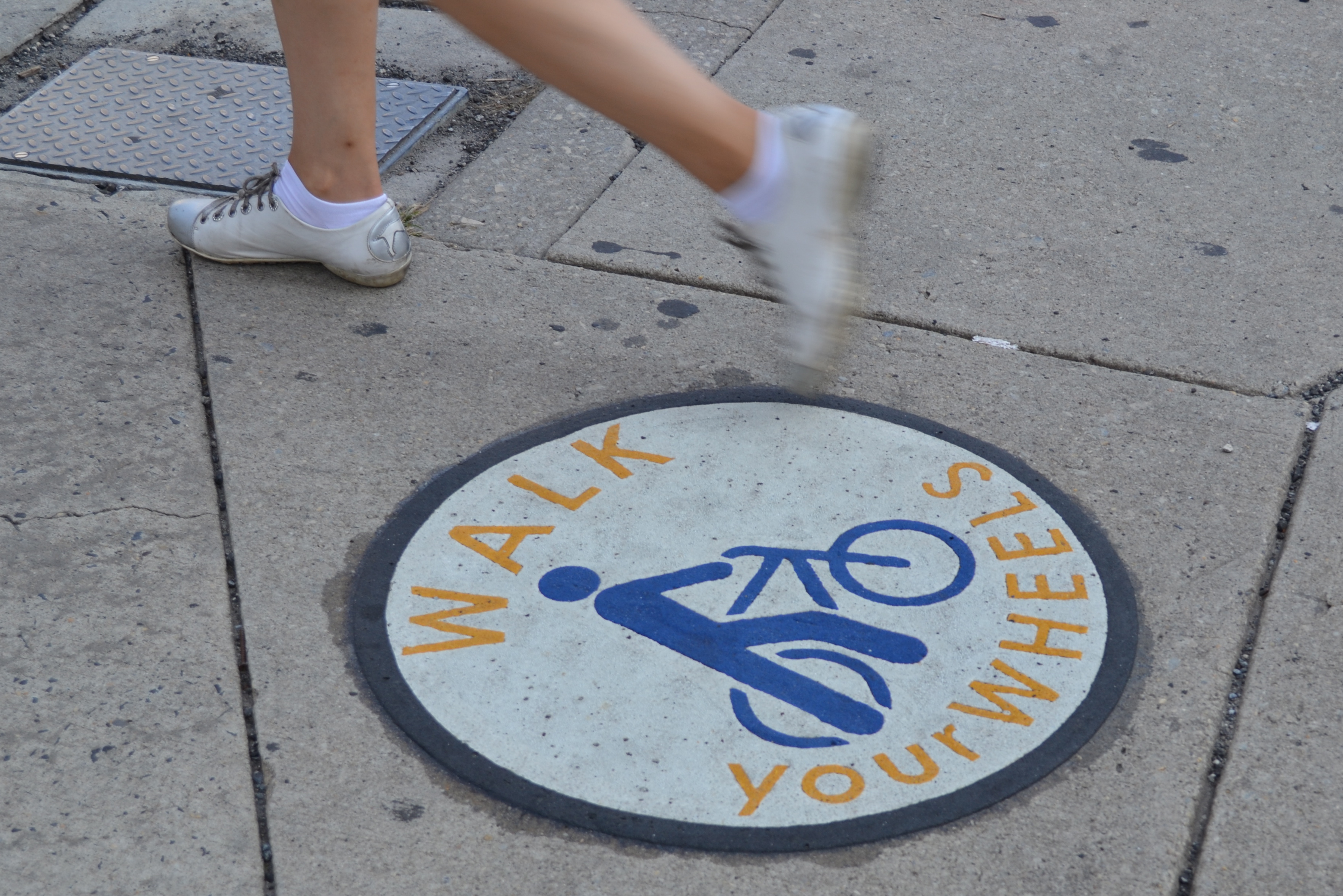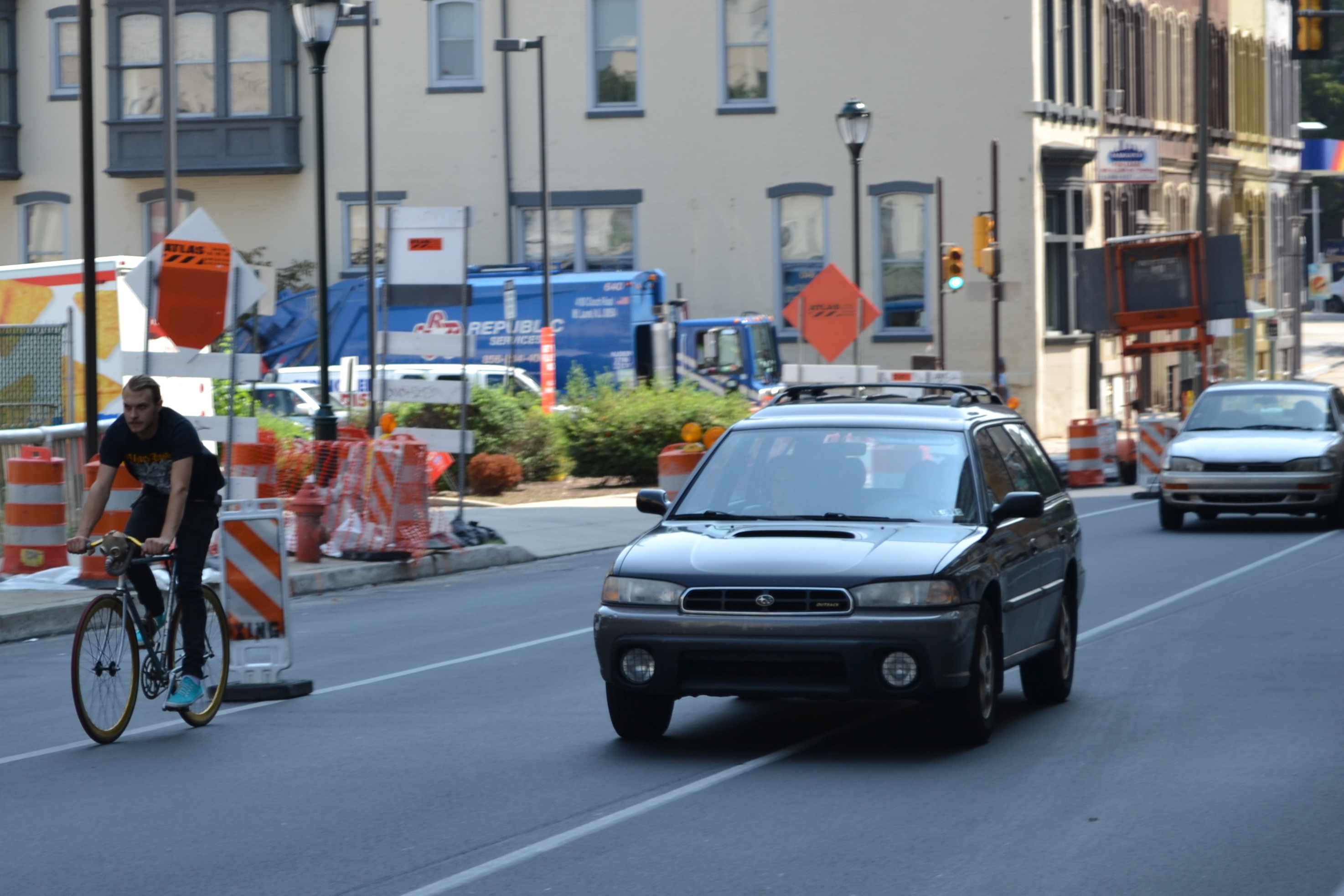“Complete streets” bill clarifies more than it changes
The much discussed “complete streets” bill does more to clarify the rules that have already been in place than it does to change them, but several bicycle and complete streets advocates say they are enthusiastic supporters of the proposed legislation.
The bill, which was recently approved by the City Council Streets and Services Committee and which will move on to a full City Council hearing, defines acceptable cyclist behavior, bicycle violation penalties, how cars should not operate in bicycle lanes and how developers should move forward to create streets that accommodate all users.
Progress for pedal pushers
The bill has received a lot of attention from the cycling community in Philadelphia because it changes the ticket price for bicycle violations, permits bicyclists to ride two abreast and eliminates the “mandatory sidepath” rule, which says that if there is an off-road bike path cyclists must ride in it and cannot ride on the road.
What the bill really does, though, is align Philadelphia’s traffic code regulations with Pennsylvania traffic code regulations.
The proposed bill would raise the city’s non-parking violation penalty from $3 to $75, but that does not change much because cyclists have and still will receive whatever penalty state law determines.
“We were able to clarify and reinforce the penalty issue to make clear that the state penalty superseded the city’s,” the Bicycle Coalition of Greater Philadelphia’s policy director Sarah Clark Stuart said.
For instance, running a red light is a non-parking violation. Under the current traffic code, the penalty is a $3 ticket, but under state traffic code the fine for running a red light is $119.50. Since the state law trumps city law, cyclists who run a red light get a $119.50 ticket, not a $3 ticket. Even if the complete streets bill passes, cyclists will receive the state penalty, which in this case will still be $119.50. See Coalition blog for more details.
One thing the bill does change is that it raises the fine for riding on the sidewalk from $50 to $75 for anyone over the age of 12.
It also removes the “mandatory sidepath” rule and a rule that says cyclists must ride singe file. These rules are not in the state traffic code, so in addition to giving bicyclists a little more security and flexibility by removing these laws, the proposed bill aligns the city law with the state law.
Sharing the road
In addition to clarifying the penalties for bicycle violations, the bill defines bicycle lanes as vehicle travel lanes and thus impacts motor vehicle drivers and pedestrians.
If the bill is approved, it will make parking or stopping in bike lanes illegal. It will also make opening a car door into traffic on a bike lane a violation. In other words, it makes it illegal to “door” bicyclists.
“It gets into the city’s code good common sense rules for not only bicycle behavior but motor vehicle behavior,” Stuart said.
Jenny Robinson, who testified in support of the bill on behalf of AAA Mid-Atlantic region, agreed.
“Whether you’re behind the steering wheel or the handle bars, driving requires common sense and courtesy,” she said.
She reported that in Pennsylvania last year there were 1,316 reportable crashes involving cars and bicycles. Those crashes included 11 deaths, two in Philadelphia.
“While these numbers are declining, there’s still more to be done and we’re happy to see some of those provisions in the bill today,” Robinson said.
Two exceptions to the new regulations are that churchgoers will still be allowed to park in the bike lanes on Pine and Spruce streets on Sundays and commercial vehicles will be able to stop in bike lanes for up to 20 minutes.
Though these regulations affect drivers, Deputy Mayor of Transportation and Utilities Rina Cutler said, “We all know there are still plenty of people driving, and this bill should not be viewed in anyway as anti-car.”
What’s in a name?
The complete streets bill builds on, as its name suggests, Mayor Michael Nutter’s 2009 executive order for the establishment of a complete streets policy.
“I don’t think there’s anything in the bill that’s completely different than what we’re already doing [by way of the executive order],” Cutler said.
“I think it just formalizes it and sends a message that we thought it was important enough to move from an executive order to a piece of legislation,” she said.
Like the executive order, the complete streets bill aims to make the roadways safer for all users. To do so, the bill requires that City and private development and transportation projects adhere to the Mayor’s Office of Transportation and Utilities’ Complete Streets Handbook.
The handbook, which will be released in mid-January, combines the criteria and polices for development that have been included in the City’s Pedestrian and Bicycle Plan, Philadelphia2035, Zoning Code Commission Report, Greenworks Philadelphia and the Green City, Clean Waters Plan.
It requires that development projects that meet a certain threshold complete a complete streets checklist, which includes some required and some recommended street treatments – i.e. curb widths and bike lane specifications – depending on the type of street that the project is located on.
Each element of the checklist is being carefully crafted to ensure that new development projects that impact roadways and sidewalks are built with the safety of all users in mind.
Alex Doty, Bicycle Coalition executive director who testified at the Streets and Services Committee hearing, said one strength of the current bill is its transparency, as it requires that checklists for all approved projects are posted online within 60 days.
The question of enforcement
Doty said if the bill is approved the next step will be education and enforcement.
But given the City’s already limited police force, some question if the new vehicle regulations will have any real impact or if people will continue to operate as they do with little consequence for their actions.
“If we want to impact bicyclists’ behavior, we need to be doing a combination of education and better facilities [such as bike lanes],” Doty said.
However, “there are a select group of people that are only going to respond to enforcement,” he said.
Still, advocates are hopeful City Council will approve the bill.
“I’m very hopeful that they’ll agree this is a very important bill for the city,” Stuart said.
Contact the reporter at cfisher@planphilly.com
WHYY is your source for fact-based, in-depth journalism and information. As a nonprofit organization, we rely on financial support from readers like you. Please give today.






